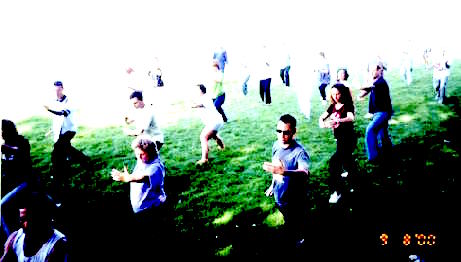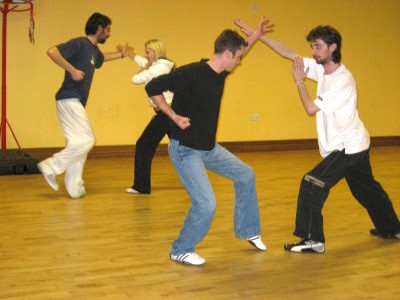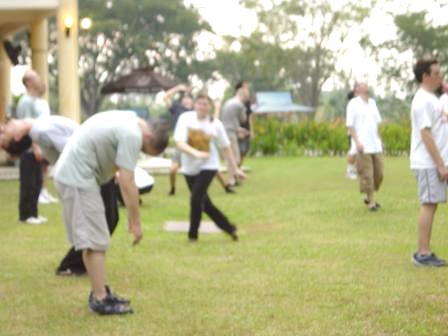October 2007 (Part 1)
SELECTION OF QUESTIONS AND ANSWERS

The best advice is to enjoy your practice and not to worry whether you are practicing correctly. This advice applies only to our school
Question 1
Sifu, I am curious to know if the way I am training at the moment is giving me maximum results in all aspects such as force and acquiring better combat skills. I want to gain maximum results in a day's training.
— Chris, Australia
Answer
This is an important topic concerning many people, and I would like to give a thorough answer.
The best advice is to enjoy your practice and not to worry whether you are practicing correctly. This advice applies to all those who have attended my intensive courses as well as all those who train in regular classes with certified Shaolin Wahnam instructors. This advice does not apply to other people who have not trained with us. For them they have to ensure that they are practicing correctly.
Why is it that those who have not learnt from us have to make sure they are practicing correctly, whereas we in Shaolin Wahnam need not, and should not, worry about it. The answer is simple and straight-forward, though it is easy for others to misconstruct the answer and accuse us for being egoistic and boastful.
Those who have attended my intensive courses and those who are training with any of our certified instructors, would have learnt the correct methods to practice. So it is unlikely they will derive adverse effects from their training, unless they commit the following two serious mistakes. One, they purposely go against the instructions. For example, they have been reminded again and again to be relaxed. But if they purposely tense their muscles, in the mistaken belief that this will give them more power, they are obviously asking for trouble.
The second serious mistake is that they worry unnecessarily. They have been repeatedly told not to worry. If they choose to worry, they are also asking for trouble. If they worry about their practice even though their methods are “technically” correct, they may developed serious side-effects. This is because our chi kung works at the mind level.
If a practitioner starts to worry or to intellectualize, not only he will not be in a chi kung state of mind but also he places much stress on his mind. Hence, even though his physical forms and breathing are correct, he is not performing the exercise correctly because his mind is under much stress. He may, or may not, get some good results from his correct forms and correct breathing, but he will get harmful side-effects from his incorrect mental state. As the mind level is the most powerful, the balance is usually negative.
Therefore, for those students who purposely do not follow our instructions, like tensing their muscles when we tell them to relax, or closing their mouth when we tell them to open it, and for those who choose to worry or intellectualize even when we repeatedly tell them not to, we have to ask them leave our class. Sometimes we may have to tell them to get out forcefully. We may have to be harsh to be kind.
It is important to note that the serious mistakes mentioned here are purposely made. These students know that they should relax, keep their mouth gently open and do not worry, but they choose to tense their muscles, keep their mouth close and worry. They purposely go against the instructions. This is different from not following the instructions due to forgetfullness or carelessness.
If a practitioner tenses his muscles, closes his mouth, or worries about his practice once a while, not because he purposely chooses to do so but becausse he forgets or is careless, it is perfectly alright. I repeat, it is perfectly alright. He may have some side-effects due to his forgetfulness or carelessness, but these side-effects are negligible and can be easily overcome by the safety mechanisms already in-built in our chi kung practice.
In other words, if a properly trained Shaolin Wahnam student once a while tenses his muscles, closes his mouth or worries during his training, he will not only not have harmful results, but also he will have benefits, even without him doing any remedial exercises to overcome his mistakes made due to carelessness or forgetfulness. Of course, if he is constantly careless or forgetful, it is a different matter.
The safety precaution is already in-built in our chi kung exercises. This is one of the two main reasons why Shaolin Wahnam members need not worry whether they are practicing correctly. This is not to say that they need not make any effort to practice correctly, but they need not worry about it. The other main reason is that they have been trained to practice correctly. What they need to do is to practice as best as they comfortably can what they have been trained to do.
These are precisely the same two reasons why most other people have to enusre they are practicing correctly. Most other people are not practicing chi kung correctly. At best they practice chi kung forms as gentle, physical exercises. Worse, they are often tensed physically and mentally during training, resulting in energy blockage instead of energy flow. The second reason is that they do not have remedial exercises to overcome the harmful side-effects which they often are unaware of.
The following is some good advice for those who say they cannot stop worrying. To stop worrying is not a difficult thing. It is not like carrying a very heavy weight, overcoming an illness overnight, or increasing your income manifold. You just stop worrying. It is that simple. If you worry habitually, you may not succeed immediately, but you can make a start. But if you really cannot stop worrying, then you should not practice our Shaolin Wahnam arts. As an analogy, if you cannot stop dashing across a busy street before looking, then you should not cross a busy street.
Question 2
I am feeling more chi. I feel tingling sensations around my body at my hands, and arms face and legs. I look forward to getting home after work for training. I love the feeling of letting go. To actually feel my spirit expand can be a great feeling. It puts a smile on my face.
Answer
These are sure signs that you are progressing very well in your practice. Keep it up.
Question 3
I have many questions I think about as I continue my practice each day. I write them down and I will send these emails to you.
Answer
Here is a very good solution for you. Take note that there are two types of questions. For convenience let us call them “think-questions” and “practice-questions”.
“Think-questions” result from your thinking on your practice. For example, you think, “What is the difference between the Horse-Riding Stance and the Bow-Aw Stance?”, “Why do we punch with a level fist?”, and “Should I say 'herit' instead of 'yaa' when performing a Tiger Claw?”.
“Practice-questions” result from your direct practice. For example, you wonder, “What should I do when I feel pain on my shoulder after a work-out?”, “Is it alright to have a shower immediately after practice?”, “Is training in the morning better than at night?”
Write your “think-questions” on a clean piece of paper, burn it, and forget about the questions. Write your “practice-questions” on your computer and e-mail them to me.

Combat application is an essential aspect of kungfu training. Here students practice sparring at a regional Shaolin Kungfu Course conducted by Sifu Jamie Robson.
Question 4
I intend to learn Shaolin Kungfu . I have learned the basics of kungfu. Now I intend to learn it more professionally and thoroughly. Since your school is renowned for Shaolin Kungfu, could you please suggest to me a way or an instructor in India?
— Malaviya, India
Answer
Thank you for your kind words.
We do not have any Shaolin Wahnam instructors in India at present. But Grandmaster Indrajidth, who has more than 20 kungfu schools in India, attended my Intensive Shaolin Kungfu Course before. Perhaps you can contact him for help. His e-mail addresses are divvaraje@hotmail.com.
Question 5
I read you were considering developing a group of young people who you would train in Kung Fu for 3 years and teach them the combat portion as well. I would be greatly interested in training and being one of these young people. Please let me know if you are still seeking candidates.
— Preston, USA
Answer
This is our Warrior Project, and is under the direction of Grandmaster Kai Uwe Jettkandt of Shaolin Wahnam Germany. It is going on very well.
Our Warrior Project is open only to existing Shaolin Wahnam students. If you are interested to train with us, you should first apply to be a student in our various Shaolin Wahnam schools in many parts of the world. Please see our List of Certified Instructors.
Question 6
I would like to clear up my confusion with internal force training. You mentioned in your questions and answers that if the stance (any) is too high then insufficient chi will flow. Does this mean that the Lifting Water stance in Tai Chi Quan will release less chi because it is higher than the Horse Riding stance?
— Thanh Vu, Australia
Answer
“Lifting Water” is normally performed at the Goat Stance, which is higher than the Horse-Riding Stance. You will probably develop more chi flow and internal force performing “Lifting Water” at the Goat Stance than at the Horse-Riding Stance.
However, many years later when you are at an advanced level and can sit comfortably at both the Goat Stance and the Horse-riding Stance, you will probably get more chi flow and internal force performing “Lifting Water” at the Horse-Riding Stance than at the Goat Stance.
Why is this so. It is because the most important factor in internal force training is to be able to relax. This is a secret many martial artists may not know. At the early stages of your training, you can relax more easily in the Goat Stance. In fact, if you sit at the Horse-Riding Stance, you will probably tense yourself after a short while. Hence, performing “Lifting Water” at the Goat Stance will give you more benefit.
But later when you can be relaxed at both the Goat Stance and at the Horse-Riding Stance, and if all other things were equal, performing “Lifting Water” at the Goat Stance will give you more chi flow, but performing “Lifting Water” at the Horse-Riding Stance will give you more internal force. This is because the Goat Stance being higher favours chi flow, whereas the Horse-Riding Stance being lower favours accumulation of chi at the dan tian resulting in more internal force.
But all other things are not equal. Although you are comfortable at both the Goat Stance and the Horse-Riding Stance, because you have spent more time practicing at the Goat Stance as you started with it, and therefore are more skillful, you will probably get more chi flow as well as more internal force performing “Lifting Water” at the Goat Stance.
Notwithstanding this, you need not worry about all this intellectualizing. As long as you practice “Lifting Water” correctly, especially that you are totally relaxed, you will get good result in chi flow and internal force irrespective of whether you use the Goat Stance or the Horse-Riding Stance.

Chi flow is natural, but chi kung enhances it manifold. This picture shows participants of a chi kung review course in Malaysia enjoying some vigorous chi flow.
Question 7
Is it possible for someone to have naturally strong chi without knowing it? Even if they have been ill for a long time but feel that there may be something draining that energy?
— Rosemarie, UK
Answer
Yes, this is possible. Some people are born with strong chi and may not realize it. Usually it is due to their pre-natal conditions. In other words, when they were conceived the conditions were favorable, like their parents were strong and healthy, the environment was pleasant, the influence from heavenly bodies was good, and the development of the foetus was favorable.
It is also possible that some people still have a lot of chi while or after they were ill. How is this possible? Isn't a lot of chi equates good health? No, it is a common mis-conception. If a person has a lot of chi but it is blocked, he can be very sick. Chi is healthy and good only when it is flowing. Having a lot of stagnant chi in the body, like in big muscles, is unhealthy.
It is healthy when chi is flowing, but it is unhealthy when it is draining. The difference between flowing and draining is that in the former in-coming chi replaces out-going chi, whereas in the latter chi just goes out without adequate replacement.
Chi flow — not just inside your body but also from the Cosmos — is natural. If you are relaxed, physically and mentally, chi will naturally flow in when a partial vacuum occurs in your body. But when you are physically tensed or mentally stressed, you block this natural chi flow. Hence, it is actually more important to breathe out than to breathe in. When you are relaxed and breathe out, you activate this natural chi flow.
Question 8
If it is possible for them to have naturally strong chi how would they go about bringing it under control?
Answer
The best way is to practice chi kung. Each time you practice chi kung, you enhance your chi flow, which is actually enhancing your flow of life.
For those who are not practiced in chi kung, a good way to have some control is as follows. Stand or sit upright comfortably. Relax. Breathe out with the mouth open quite wide. Then breathe in gently. Repeat this breathing out and breathing in about 10 to 20 times. Then gently think of a spot about two or three inches below the naval.
Question 9
Please forgive me if I misunderstand about chi. It was something that was suggested to me recently. I was told that I have certain abilities to do with the mind that I was not really aware of and that I should enquire about chi energy.
Answer
You are welcomed to ask me questions. It is a pleasure to answer questions from people like you who are polite and fulfill all the three conditions I request for asking me questions.
You are right. All of us have great abilities of the mind that we are not aware of. Scientists estimate that we use only about 10% of our mind. If one can increase that by a few percents, he or she would be a genius.
Chi kung is an excellent discipline to train the mind, besides training energy and the physical body. In the past chi kung was known as “triple cultivation”.
I would like to share with you a great cosmic truth. What you are and will be, is what you think. If one constantly thinks of himself as being sick and unhappy, he will be sick and unhappy. It is very important that you must always have noble thoughts — of yourself and of others. And especially when your mind has become powerful, you must always use it for good.
Chi flow — not just inside your body but also from the Cosmos — is natural. If you are relaxed, physically and mentally, chi will naturally flow in when a partial vacuum occurs in your body. But when you are physically tensed or mentally stressed, you block this natural chi flow. Hence, it is actually more important to breathe out than to breathe in. When you are relaxed and breathe out, you activate this natural chi flow.
LINKS
Selected Reading
- The Formidable Three Rings Around the Moon
- Penetrating the Impenetrable
- Chinese Martial Arts and Spiritual Cultivation
- Appying Strategies for Effective Combat
- Important Questions regarding Practice after Intensive Chi Kung Course
